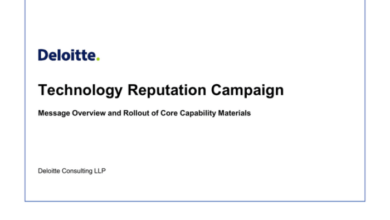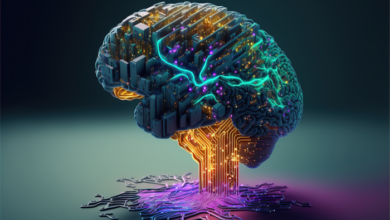
Deloitte AI Ethics Study: Navigating the Moral Landscape
The Deloitte AI Ethics Study delves into the complex and evolving landscape of artificial intelligence, examining the ethical considerations that arise from its development and deployment. This study isn’t just about technology; it’s about the impact AI has on individuals, businesses, and society as a whole.
The study highlights the critical need for responsible AI governance and explores the various ethical frameworks that guide its development. It emphasizes the importance of integrating ethical considerations into every stage of the AI lifecycle, from design to deployment, to ensure that AI serves humanity and promotes a more equitable future.
Case Studies and Examples: Deloitte Ai Ethics Study

The real world is filled with AI applications that raise ethical questions. Understanding these applications and the challenges they present is crucial for responsible AI development and deployment.
Challenges and Opportunities in Different Industries
The ethical implications of AI vary significantly across industries. Here are some examples:
- Healthcare:AI-powered diagnostic tools have the potential to improve patient outcomes. However, there are concerns about bias in algorithms, leading to disparities in care. For example, a study found that an AI system used to predict patient risk was less accurate for Black patients than for White patients.
This highlights the need for robust data and algorithmic fairness in healthcare AI.
- Finance:AI is used extensively in financial institutions for tasks like fraud detection and credit scoring. However, there are concerns about algorithmic bias and transparency. For example, an AI system used for loan approvals might disproportionately deny loans to certain demographics due to historical data biases.
This emphasizes the importance of explainability and fairness in financial AI.
- Education:AI-powered learning platforms can personalize education and provide tailored instruction. However, there are concerns about student privacy and the potential for AI to exacerbate existing inequalities. For example, an AI system that uses student data to predict academic performance might unfairly label students based on their socioeconomic background.
This underscores the need for responsible data governance and equitable access to AI in education.
Case Study: Facial Recognition in Law Enforcement
Facial recognition technology is increasingly used by law enforcement agencies for tasks like identifying suspects and monitoring crowds. However, this technology raises significant ethical concerns.
- Privacy Concerns:Facial recognition systems collect and store vast amounts of personal data, raising concerns about privacy violations. The technology can be used to track individuals without their consent, potentially leading to surveillance and harassment.
- Accuracy and Bias:Facial recognition algorithms are not always accurate, and they can be biased against certain demographics. For example, studies have shown that facial recognition systems are less accurate for people of color than for White people. This bias can lead to wrongful arrests and misidentifications.
- Misuse and Abuse:Facial recognition technology can be misused for surveillance and control. For example, authoritarian regimes have used it to monitor and suppress political dissent. There are also concerns about the technology being used for discriminatory purposes, such as targeting specific groups for surveillance.
Solutions:To address these ethical concerns, it is crucial to implement safeguards and regulations. Some proposed solutions include:
- Data Privacy and Transparency:Ensuring that data collected by facial recognition systems is used ethically and responsibly, with clear policies for data storage, access, and deletion.
- Algorithmic Fairness and Accuracy:Developing and deploying algorithms that are fair and accurate, with rigorous testing and validation to minimize bias.
- Public Oversight and Accountability:Establishing clear guidelines for the use of facial recognition technology, with independent oversight and mechanisms for accountability.
- Ethical Frameworks:Developing ethical frameworks that guide the development and deployment of facial recognition technology, taking into account the potential risks and benefits.
Future Directions in AI Ethics

The field of AI ethics is rapidly evolving, driven by the relentless pace of advancements in AI technology. As AI systems become increasingly sophisticated and integrated into various aspects of our lives, ethical considerations are becoming more complex and critical.
This section explores emerging trends and challenges in AI ethics, the potential impact of AI advancements on ethical considerations, and insights on fostering responsible AI development and deployment.
The Rise of Explainable AI (XAI), Deloitte ai ethics study
Explainable AI (XAI) is a crucial area of research and development in AI ethics. As AI systems become more complex, it becomes increasingly challenging to understand how they reach their decisions. This lack of transparency can lead to biases, discrimination, and a lack of trust in AI systems.
XAI aims to develop techniques and methods to make AI systems more transparent and understandable, enabling humans to comprehend the reasoning behind their decisions. This transparency is essential for building trust, accountability, and ethical AI systems.
The Importance of Data Governance and Privacy
The vast amount of data used to train AI systems raises significant ethical concerns related to data governance and privacy. The collection, storage, and use of personal data must be carefully considered to ensure ethical and responsible AI development. Data governance frameworks and regulations are essential to protect individual privacy and prevent the misuse of data.
The development of AI systems that respect data privacy and minimize the collection and storage of sensitive information is crucial for fostering ethical AI.
The Impact of AI on Employment and Labor Markets
The rapid advancement of AI technology is transforming the labor market, raising concerns about job displacement and the potential impact on employment. As AI systems automate tasks previously performed by humans, it is crucial to address the ethical implications of this shift.
Strategies for reskilling and upskilling the workforce are essential to mitigate the negative impacts of AI on employment. The development of policies and programs that support workers transitioning to new roles and industries is crucial for ensuring a just and equitable transition in the age of AI.
Deloitte’s AI ethics study delves into the complexities of responsible AI development, highlighting the importance of fairness, transparency, and accountability. These principles resonate deeply with the “sister style, nothing fancy” ethos, which emphasizes simplicity and authenticity. Sister Style, Nothing Fancy encourages us to focus on what truly matters, aligning perfectly with Deloitte’s call for ethical AI practices that prioritize human well-being.
The Deloitte AI Ethics study highlights the importance of responsible AI development, a topic that resonated with me after reading about the fascinating our Christmas tree train project. The train, a testament to human ingenuity and creativity, raises similar questions about the ethical implications of technology and how it can be used to create something beautiful and beneficial.
Just like the train, AI can be a powerful tool for good, but only if we approach its development with careful consideration and ethical frameworks.
The Deloitte AI Ethics Study delves into the complexities of responsible AI development and deployment, highlighting the need for ethical considerations across all stages. It’s a reminder that even seemingly simple projects, like crafting a DIY wooden bead chandelier , can benefit from ethical reflection.
Just as we choose sustainable materials for our crafts, we must also prioritize responsible AI practices to ensure positive societal impact.







